
Pixel-Bit- Revista de Medios y Educacion
Scope & Guideline
Advancing the Intersection of Media and Education
Introduction
Aims and Scopes
- Integration of Digital Technologies in Education:
The journal explores how digital tools and technologies, such as artificial intelligence, virtual reality, and mobile applications, can be effectively integrated into educational practices to enhance learning outcomes. - Development of Digital Competence:
A significant focus is placed on assessing and improving digital competence among educators and students, examining factors that influence technology use and the implications for teaching and learning. - Innovative Pedagogical Approaches:
Research on innovative pedagogical strategies, including flipped classrooms, gamification, and blended learning, is a core area of interest, showcasing how these approaches can transform educational experiences. - Impact of Social Media and Online Environments:
The journal addresses the role of social media and online platforms in education, investigating their effects on communication, collaboration, and learning processes among students and educators. - Research Methodologies in Educational Technology:
The journal emphasizes the use of various research methodologies, including qualitative and quantitative approaches, to investigate the effectiveness of educational technologies and their impact on learning.
Trending and Emerging
- Artificial Intelligence in Education:
There is a rising trend in research exploring the applications of artificial intelligence, such as ChatGPT and generative AI, in educational settings, indicating a strong interest in how these technologies can enhance learning and assessment. - Virtual and Augmented Reality:
Research on the impact of virtual and augmented reality on educational practices is gaining momentum, with studies examining their effectiveness in improving engagement and comprehension among students. - Digital Competence Frameworks:
Emerging interest in frameworks for assessing digital competence among educators and students is evident, reflecting the need for structured approaches to evaluate and improve technology use in education. - Inclusive and Adaptive Learning Technologies:
There is a growing focus on technologies that support inclusive education and adapt to diverse learner needs, including research on social robots and tools for students with special educational needs. - Impact of Social Media on Learning:
Exploration of the influence of social media on learning processes and student engagement is trending, as researchers seek to understand how these platforms can be leveraged for educational purposes.
Declining or Waning
- Traditional Classroom Practices:
There is a noticeable decline in research focused on traditional, non-digital classroom practices, as emphasis shifts towards innovative and technology-enhanced learning environments. - Generalized ICT Training:
While digital competence remains important, there is less emphasis on generalized ICT training without specific contexts or applications, as research increasingly highlights targeted skills and competencies. - Static Educational Models:
Research on static or unchanging educational models is becoming less prominent, with a growing preference for dynamic, adaptable approaches that respond to technological advancements and learner needs. - Assessment of Basic Digital Skills:
Studies focusing solely on basic digital skills without considering higher-order thinking and application in real-world contexts are declining, as the journal shifts towards more comprehensive assessments. - Content-Centric Learning:
There is a decreasing focus on content-centric learning approaches, as the journal emphasizes learner-centered methodologies that foster critical thinking and problem-solving skills.
Similar Journals
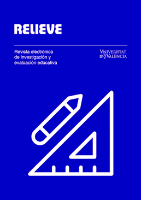
RELIEVE-Revista Electronica de Investigacion y Evaluacion Educativa
Empowering educators with cutting-edge evaluation insights.RELIEVE-Revista Electronica de Investigacion y Evaluacion Educativa is a leading open-access journal dedicated to advancing research and evaluation in the field of education. Published by the ASOC INTERUNIVERSITARIA INVESTIGACION PEDAGOGICA in Spain, this esteemed journal, with an ISSN of 1134-4032, has been a pivotal platform for scholarly discourse since its inception in 1995. As of 2023, it is ranked in the Q2 Quartile for Education within Scopus, reflecting its significant impact in the academic community, where it occupies the 61st percentile among 1543 journals in the Social Sciences Education category. Spanning the years 2001 to 2024, RELIEVE covers a broad scope of topics within educational research and evaluation, making it an invaluable resource for educators, researchers, and policy makers alike. With its commitment to open access, the journal ensures that critical educational research is freely available to inspire innovation and improvement in educational practices across the globe.

E-Learning and Digital Media
Empowering educators with cutting-edge e-learning insights.E-Learning and Digital Media, published by SAGE Publications Inc, is a premier academic journal dedicated to the innovative intersection of digital technologies and education. With a strong commitment to advancing research in the fields of education and computer science, this journal has established itself as a vital resource for researchers, professionals, and students alike. As of 2023, it proudly holds a Q2 ranking in both Computer Science Applications and Education, reflecting its impact and reach within the academic community. The journal encompasses a wide range of topics exploring the effectiveness and applications of e-learning technologies, pedagogical strategies, and digital media in educational settings. Since its inception in 2009, E-Learning and Digital Media has continuously contributed to the understanding and development of digital education, ensuring relevancy in an ever-evolving landscape. With an open access model intended to foster accessibility and dissemination of knowledge, this journal invites submissions that push the boundaries of traditional education through cutting-edge research and practice.

RIED-Revista Iberoamericana de Educacion a Distancia
Connecting Educators and Researchers WorldwideRIED-Revista Iberoamericana de Educacion a Distancia is a premier academic journal dedicated to the dynamic field of distance education, published by the ASOCIACION IBEROAMERICANA EDUCACION SUPERIOR & DISTANCIA - AIESAD. Established in 1998 as an Open Access journal, it provides a valuable platform for researchers, educators, and practitioners to disseminate and access cutting-edge research and innovative practices in distance learning. With its ISSN 1138-2783 and E-ISSN 1390-3306, RIED ranks within the top 2nd Quartile (Q2) in both Computer Science Applications and Education as of 2023, showcasing its significant impact and relevance in academia. Positioned in Spain, the journal not only serves the Ibero-American educational community but also contributes to the global discourse on online education methodologies and technologies. With an impressive Scopus ranking in the 92nd percentile for Social Sciences (Education) and 77th percentile for Computer Science (Computer Science Applications), RIED is essential for those seeking to advance their understanding and expertise in the realm of distance education.
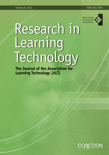
Research in Learning Technology
Exploring the Frontiers of Learning Technology ResearchResearch in Learning Technology, published by the Association for Learning Technology (ALT)impact factor, the journal has consistently ranked in the top quartiles of both the Education (Q1) and Computer Science Applications (Q2) categories as of 2023, highlighting its significance and influence in the academic community. The journal is committed to disseminating high-quality research and practical insights that bridge the gap between technology and pedagogy, making it an essential resource for researchers, educators, and practitioners alike. The Scopus rankings further emphasize its reputation, placing it in the top 10% of social sciences education journals. As an open-access journal, Research in Learning Technology ensures that its valuable content is freely accessible, empowering a global audience to drive innovation in learning technology. Whether you are a seasoned researcher or a student exploring this dynamic field, this journal serves as a vital platform for sharing knowledge and advancing the discourse in learning technologies.
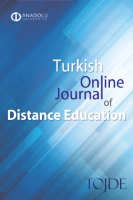
Turkish Online Journal of Distance Education
Empowering Educators through Open Access Insights.Turkish Online Journal of Distance Education, a distinguished publication from ANADOLU UNIVERSITY, serves as a vital resource in the field of distance education, contributing significantly to the ongoing discourse since its inception in 2000. With an impressive impact factor that reflects its standing within the academic community, this open access journal provides an influential platform for researchers, educators, and practitioners to disseminate innovative findings and educational strategies. Ranked in the Q2 category within the education sector according to the 2023 quartile rankings, and boasting a commendable position of #423 out of 1543 in Scopus' Social Sciences Education rankings, the journal places itself firmly within the 72nd percentile of its cohort. Spanning from 2004 to 2024, the journal's commitment to advancing scholarship in distance education is reflected not only in its comprehensive articles but also in its responsive engagement with contemporary educational challenges. Positioned in Eskişehir, Turkey, this journal aims to elevate discussions surrounding online learning and contributes to the global dialogue on education accessibility and innovation.
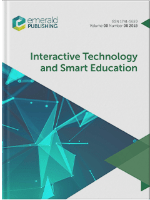
Interactive Technology and Smart Education
Empowering learning with cutting-edge technology.Interactive Technology and Smart Education is a leading academic journal published by EMERALD GROUP PUBLISHING LTD, dedicated to exploring the dynamic intersection of technology and education. With a robust impact factor signifying its significant contributions to the field, this journal consistently ranks in the Q1 quartile in categories such as Computer Science (Miscellaneous), Education, and E-learning, reflecting its prestige and wide-ranging influence. A staple for researchers, educators, and industry professionals, the journal addresses innovative practices and developments in interactive technologies that enhance teaching and learning experiences. Operating from its base in the United Kingdom, the journal spans nearly two decades of impactful publishing, featuring high-quality research that plays a crucial role in shaping the future of education through technology. Scholars seeking to stay at the forefront of this evolving field are encouraged to contribute and engage with the journal's pioneering work.
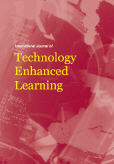
International Journal of Technology Enhanced Learning
Bridging the Gap Between Technology and Effective LearningInternational Journal of Technology Enhanced Learning, published by INDERSCIENCE ENTERPRISES LTD, is a premier scholarly journal that comprehensively explores the intersection of technology and education, fostering innovative approaches to enhance learning processes. Established in 2008 and continuing through 2024, the journal is pivotal for researchers, educators, and technology professionals aiming to disseminate and engage with cutting-edge developments in technology-enhanced learning environments. With an admirable ranking in Scopus—placing in the 72nd percentile of Education and 49th in Computer Science Applications—the journal reflects a robust influence in the fields of Computer Science Applications and Education, as evidenced by its Q2 and Q3 quartile rankings. The journal not only provides a platform for empirical research and theoretical discourse but also emphasizes practical implementations in e-learning. Although it does not offer open access, its curated collection of articles serves as a vital resource for scholars and practitioners who are dedicated to advancing the nexus of technology and education.
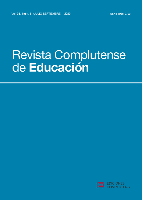
Revista Complutense de Educacion
Advancing Educational Research Since 1990Revista Complutense de Educación is a prominent academic journal published by Universidad Complutense de Madrid, specifically from their Servicio de Publicaciones. With an ISSN of 1130-2496 and an E-ISSN of 1988-2793, this open-access journal has been disseminating knowledge in the field of education since 1990, making it a valuable resource for researchers, educators, and practitioners alike. The journal encompasses a wide array of topics pertinent to educational theory, practice, and innovations, and has established its credibility in the academic community, as reflected in its Q3 ranking in the field of Education according to Scopus. Ranked #673 out of 1543 in the Social Sciences Education category, with a 56th percentile ranking, it serves as a vital platform for scholarly discourse and the sharing of cutting-edge research. With a convergence of contributions from 2009 to 2024, the Revista Complutense de Educación continues to enhance the landscape of educational research, promoting a better understanding of contemporary educational challenges and solutions.

Aloma-Revista de Psicologia Ciencies de l Educacio i de l Esport
Unlocking Insights at the Crossroads of Science and SportAloma-Revista de Psicologia Ciencies de l Educacio i de l Esport, published by Ramon Llull University in Spain, serves as a pivotal platform for the dissemination of cutting-edge research across the intersecting domains of psychology, education, and sports sciences. With an ISSN of 1138-3194 and an E-ISSN of 2339-9694, Aloma is indexed in prominent databases and categorized within Q3 quartile rankings in various fields, including Psychology, Education, and Physical Therapy. This journal's accessibility and commitment to enhancing scholarly discourse make it an essential resource for researchers, practitioners, and students seeking to deepen their knowledge and advance their professional practices. Leveraging its convergence years from 2018 to 2024, Aloma aims to foster interdisciplinary understanding and innovative solutions to contemporary challenges in the social sciences and health professions, making it a vital contributor to the academic community.

Journal of University Teaching and Learning Practice
Innovating Teaching Strategies for Tomorrow's ScholarsWelcome to the Journal of University Teaching and Learning Practice, a premier publication dedicated to advancing research and practice in higher education. Published by UNIV WOLLONGONG, this journal provides a vital platform for educators, researchers, and practitioners to explore innovative teaching methodologies and learning strategies to enhance the university experience. With an impressive impact factor and categorized in the Q2 quartile for Education in 2023, this journal ranks in the top percentile of educational research, boasting a Scopus rank of 437 out of 1543 in Social Sciences Education. Since its inception in 2016, the journal has become a significant contributor to the field, fostering a scholarly dialogue among scholars from around the globe. Although currently not operating under an Open Access model, it offers valuable insights and is committed to publishing high-quality research that reflects best practices in educational settings. Join our community of academics dedicated to transforming university teaching and learning through rigorous scholarship and innovative practices.